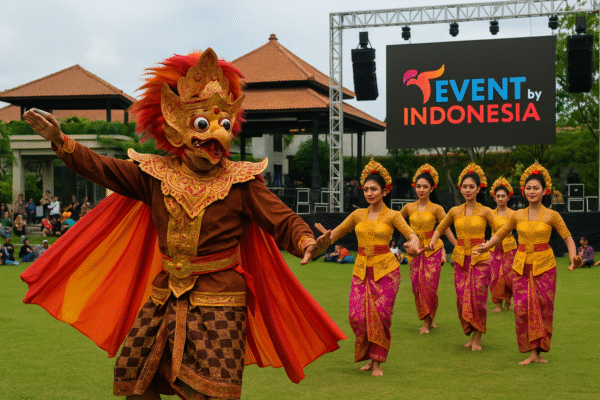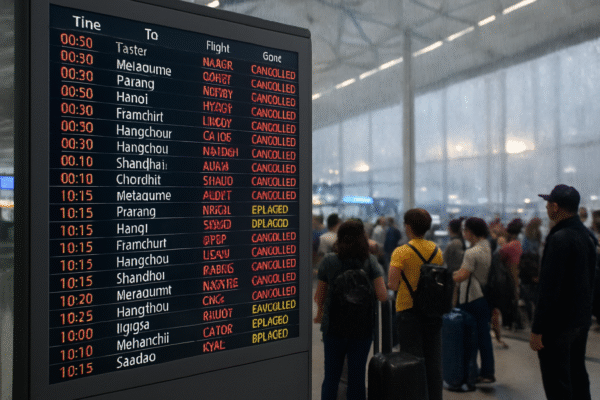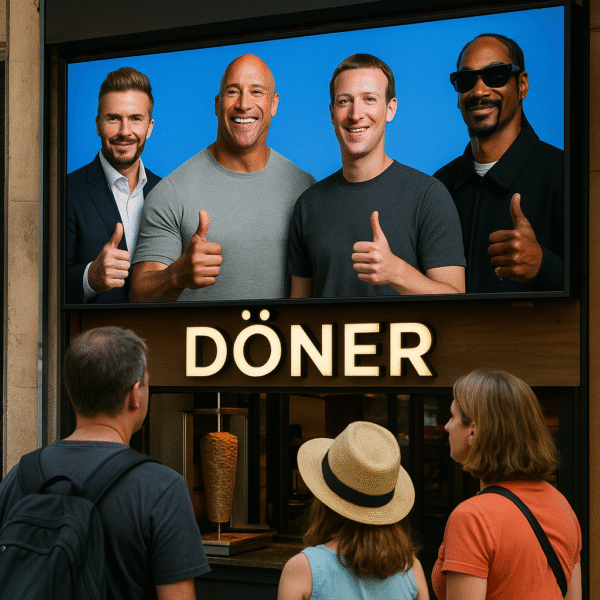Istanbul Tourists Tricked by AI-Generated Celebrity Endorsements: A Growing Travel Scam Trend
A recent incident in Istanbul has raised global concerns over the use of artificial intelligence in deceiving tourists. What began as an innocent dinner hunt for one international family turned into a cautionary tale, after they were lured into a local kebab shop by digital billboards showcasing AI-generated images of celebrities endorsing the venue.
The flashing signboard displayed hyper-realistic photos of global icons including David Beckham, Dwayne “The Rock” Johnson, Mark Zuckerberg, and Snoop Dogg, all seemingly praising the eatery. For many travelers, seeing such international figures “endorse” a venue would be enough to assume credibility. However, on closer inspection, a barely visible disclaimer revealed the truth: “Imagined by AI.”
This incident underscores an emerging global issue—AI-generated scams in tourism. As artificial intelligence becomes increasingly sophisticated, so do the methods used to mislead international visitors, from fabricated endorsements to fake accommodations and AI-crafted reviews.
Global Rise of AI Travel Scams
The Istanbul case is not isolated. Government travel advisory boards, including Australia’s Smartraveller, the UK’s Foreign, Commonwealth & Development Office, and the U.S. State Department, have issued updated warnings regarding AI-generated scams targeting both leisure and business travelers.
A troubling example from Vietnam saw tourists duped by a “sustainable lodge” advertised online with AI-generated imagery. Upon arrival, guests found only a makeshift shack. In Bali, Indonesia, multiple travelers reported discovering villas listed with surreal architecture and digitally altered images clearly created by generative AI tools.
These tactics not only manipulate tourist expectations but can also financially and emotionally harm travelers. With false booking websites, deepfake videos, and chatbot impersonators now in circulation, verifying the legitimacy of travel offers is becoming more challenging than ever.
Travel Industry at Risk
The impact of AI-driven deception is particularly severe for travel professionals and business travelers. When companies unknowingly rely on false listings or fraudulent bookings, it can disrupt itineraries, increase costs, and endanger employees.
AI-generated reviews on platforms like Google, Tripadvisor, or Booking.com also mislead tourists into choosing subpar or non-existent venues. Unscrupulous vendors exploit the trust users place in high star-ratings and convincing visuals.
Official Government Travel Safety Recommendations
To combat this rising threat, several government and tourism bodies recommend a proactive and cautious approach to travel planning:
- Verify Directly: Book flights and accommodations through official airline or hotel websites. Avoid relying solely on third-party links in promotional emails or social media posts.
- Cross-Check Reviews: Compare feedback across multiple platforms. Be wary of reviews that seem overly polished, repetitive, or vague.
- Beware of Chatbots: AI-powered bots may offer deals that appear attractive but are crafted to extract personal or financial data.
- Protect Personal Data: Never enter credit card or passport information on unfamiliar or unsecured websites.
Travelers are also urged to report suspicious digital advertisements to local tourism authorities or consulates to help alert others.
Tips for Tourists Visiting Istanbul
Istanbul, a world-renowned tourism hub blending East and West, offers authentic experiences steeped in history, cuisine, and culture. However, as this AI scam reveals, visual appeal can be misleading.
- Trust Local Recommendations: Authentic Turkish eateries rarely depend on celebrity endorsements. Instead, look for consistent reviews from real users on Tripadvisor, Google Maps, or local blogs.
- Visit Verified Sources: The Turkish Ministry of Culture and Tourism and Go Türkiye provide up-to-date information on legitimate attractions, restaurants, and accommodations.
- Inquire at Tourism Offices: Istanbul’s official visitor centers offer printed guides and face-to-face consultations, helping travelers navigate safely and avoid scams.
Future Outlook: The Need for Digital Literacy in Tourism
As AI technology continues to evolve, so will the complexity of scams. While tourism departments and governments are working to regulate the use of deepfake tools and deceptive advertising, the responsibility also falls on travelers to remain digitally literate and skeptical.
Hotels, restaurants, and travel agencies are encouraged to maintain transparency by building online reputations grounded in authentic customer experiences. Verified content, clear communication, and official certifications can help rebuild trust in a rapidly evolving tourism landscape.
Travelers must remember: if a deal or advertisement seems too visually perfect—or if a kebab shop claims Snoop Dogg is a loyal fan—it’s worth taking a second look, reading the fine print, and using official resources before deciding.
Final Word
The digital age has brought incredible convenience to global tourism, but it also presents new vulnerabilities. The Istanbul AI scam is a stark reminder of how modern tools can be used to manipulate trust and mislead visitors. Staying informed, cautious, and critical of what we see online is essential—not just for enjoyable trips, but for our safety and peace of mind abroad.
For more travel news like this, keep reading Global Travel Wire



















